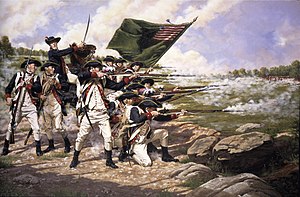Battle of Brooklyn
| Battle of Long Island | |||||||
|---|---|---|---|---|---|---|---|
| Part of the American Revolutionary War | |||||||
 The Delaware Regiment at the Battle of Long Island. |
|||||||
|
|||||||
| Belligerents | |||||||
|
|
|||||||
| Commanders and leaders | |||||||
|
|
|
||||||
| Strength | |||||||
| 10,000 | 20,000 | ||||||
| Casualties and losses | |||||||
|
Total: 2,000 300 killed 800 wounded 1,079 captured |
Total: 388 64 killed 293 wounded 31 missing |
||||||
The Battle of Long Island is also known as the Battle of Brooklyn and the Battle of Brooklyn Heights. It was fought on August 27, 1776 and was the first major battle of the American Revolutionary War to take place after the United States declared its independence on July 4, 1776. It was a victory for the British Army and the beginning of a successful campaign that gave them control of the strategically important city of New York. In terms of troop deployment and fighting, it was the largest battle of the entire war.
After defeating the British in the Siege of Boston on March 17, 1776, commander-in-chief General George Washington brought the Continental Army to defend the port city of New York, then limited to the southern end of Manhattan Island. Washington understood that the city's harbor would provide an excellent base for the British Navy during the campaign, so he established defenses there and waited for the British to attack. In July, the British under the command of General William Howe landed a few miles across the harbor from Manhattan on the sparsely-populated Staten Island, where they were slowly reinforced by ships in Lower New York Bay during the next month and a half, bringing their total force to 32,000 troops. Washington knew the difficulty in holding the city with the British fleet in control of the entrance to the harbor at the Narrows, and he moved the bulk of his forces to Manhattan, believing that it would be the first target.
...
Wikipedia
